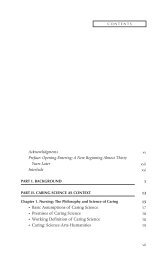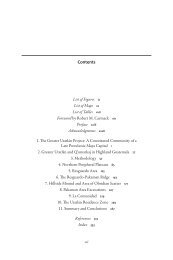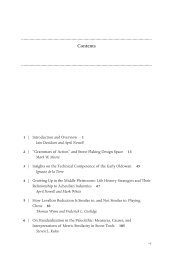free download - University Press of Colorado
free download - University Press of Colorado
free download - University Press of Colorado
Create successful ePaper yourself
Turn your PDF publications into a flip-book with our unique Google optimized e-Paper software.
Charles L. Redman<br />
The new insights archaeological case studies <strong>of</strong>fer are particularly welcome<br />
in that global environmental change is one <strong>of</strong> the primary threats to society in<br />
the twenty-first century. Because the impact <strong>of</strong> climate change can be expected<br />
to be a gradual process that, on average, may not change as much as interannual<br />
or interregional variability, most global changes will not be obvious to<br />
the casual observer. However, predictions are that we will best sense the effects<br />
<strong>of</strong> anthropogenic climate change through the occurrence <strong>of</strong> more frequent<br />
and extreme “natural events.” For example, the gradual increase in atmospheric<br />
temperature will not be noticeable on a year-to-year basis (or at least separable<br />
from normal inter-annual fluctuations), yet it is likely that the frequency and<br />
intensity <strong>of</strong> heat waves impacting cities around the world will increase and significantly<br />
affect their populations. Heat waves are already the natural disaster<br />
responsible for the greatest number <strong>of</strong> fatalities worldwide, and we can expect<br />
that number to grow in the coming decades. Climate change will also alter<br />
regional precipitation patterns, leading to more frequent and intense flooding<br />
in some regions and more frequent and intense droughts in others. These<br />
changes, in turn, will exacerbate patterns <strong>of</strong> erosion and be responsible for<br />
mudslides, dust storms, and other hazards. It is expected that as ocean waters<br />
warm, storms such as hurricanes will increase in intensity, leading to greater<br />
wind damage and coastal flooding.<br />
The impacts <strong>of</strong> global climate change will most likely be experienced as<br />
the kinds <strong>of</strong> natural hazards that have been happening regionally since prehistoric<br />
times, but they can be expected to occur more frequently and to be<br />
more intense. Hence, the way people have organized themselves in the face<br />
<strong>of</strong> regional natural hazards or sudden environmental changes in the past provides<br />
insight into what the key variables will be in organizing ourselves to<br />
recognize and deal with global environmental change in the future. Several<br />
observations reported in this volume’s chapters have revealed patterns in the<br />
past that should help structure contemporary thinking. A theme that runs<br />
through almost all <strong>of</strong> the chapters is that environmental change and natural<br />
hazards are not disasters in themselves. As Jago Cooper points out, the recognition<br />
and impact <strong>of</strong> hazards on local societies are culturally contingent<br />
and are very much shaped by the ecological knowledge <strong>of</strong> members <strong>of</strong> the<br />
society. Several <strong>of</strong> the authors indicate that the way these hazards are culturally<br />
constructed and conveyed is directly related to their frequency <strong>of</strong> occurrence<br />
and impact in the recent past. More frequent and more sudden hazards<br />
are <strong>of</strong>ten prominently encoded in local knowledge and are more likely to be<br />
acted upon in precautionary ways Cooper and Payson Sheets describe in the<br />
volume’s introduction.<br />
Geography is also a key factor in understanding human attitudes and adaptations<br />
to potential natural hazards. Although volcanic activity is not usually<br />
associated with anthropogenically caused global environmental change, it is<br />
238





